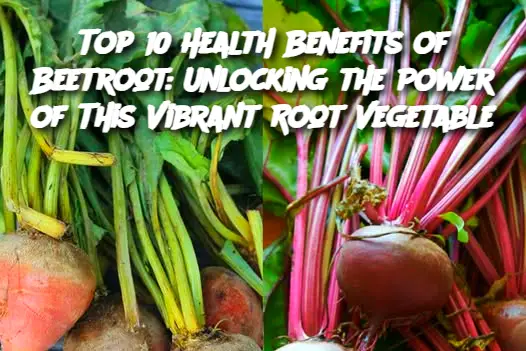Beetroot Salad with Feta and Walnuts: Roast beetroot and combine it with crumbled feta cheese, toasted walnuts, and arugula for a nutrient-packed salad. Dress it with olive oil and balsamic vinegar for added flavor.
Beetroot Smoothie: Blend raw beetroot with fruits like apples, berries, and a splash of lemon juice to make a refreshing and detoxifying smoothie.
Pickled Beetroot: Slice boiled beetroot and immerse it in a mixture of vinegar, sugar, and spices to create a tangy and crunchy pickle.
Beetroot Soup: Make a delicious beetroot soup by combining boiled or roasted beets with onions, garlic, vegetable stock, and a splash of cream for a rich and hearty dish.
Frequently Asked Questions (FAQ)
What are the health benefits of beetroot?
Beetroot offers a wide range of health benefits, including improving blood circulation, lowering blood pressure, supporting liver health, boosting stamina, and providing anti-inflammatory properties. It’s also packed with antioxidants and can aid in digestion and detoxification.
Can beetroot help lower blood pressure?
Yes, beetroot is known to help lower blood pressure. It contains nitrates, which are converted into nitric oxide in the body, helping to relax and dilate blood vessels, improving blood flow and reducing blood pressure.
Is beetroot good for weight loss?
Beetroot is a low-calorie vegetable, rich in fiber, which can help with digestion and promote a feeling of fullness. Its fiber content makes it a great addition to a weight-loss-friendly diet, as it can help curb overeating.
How does beetroot improve athletic performance?
Beetroot is known to improve endurance and athletic performance due to its nitrate content, which increases blood flow to muscles and reduces oxygen consumption during exercise. This can help athletes perform better and recover faster.
Can beetroot help with detoxification?
Yes, beetroot supports liver health and acts as a natural detoxifier. Its high antioxidant content helps neutralize free radicals in the body and promote the elimination of toxins through the liver.
How can I incorporate beetroot into my diet?
There are many ways to incorporate beetroot into your diet, such as adding it to salads, blending it into smoothies, roasting it as a side dish, or even making beetroot juice. Be creative and enjoy the vibrant color and earthy flavor of this nutrient-dense root vegetable.
Can beetroot be consumed raw?
Yes, beetroot can be consumed raw, though it may be tough to eat on its own. Grate raw beetroot into salads or blend it into smoothies for a nutritious addition. If you prefer a milder flavor, roasting or steaming beetroot can enhance its taste.
Are there any side effects of eating beetroot?
Beetroot is generally safe to consume for most people. However, consuming large quantities may lead to pink or red urine or stool, a harmless condition known as beeturia. Some people may also experience digestive discomfort due to its high fiber content, so it’s best to consume it in moderation.
Conclusion
Beetroot is a powerhouse of nutrients and offers a wide variety of health benefits, from improving cardiovascular health to boosting athletic performance and detoxifying the body. With its versatility in the kitchen, you can easily incorporate this vibrant root vegetable into your diet through juices, smoothies, salads, and roasted dishes. Whether you’re looking to improve your heart health, increase energy levels, or simply add some color to your plate, beetroot is a must-try vegetable for any health-conscious individual.
ADVERTISEMENT

